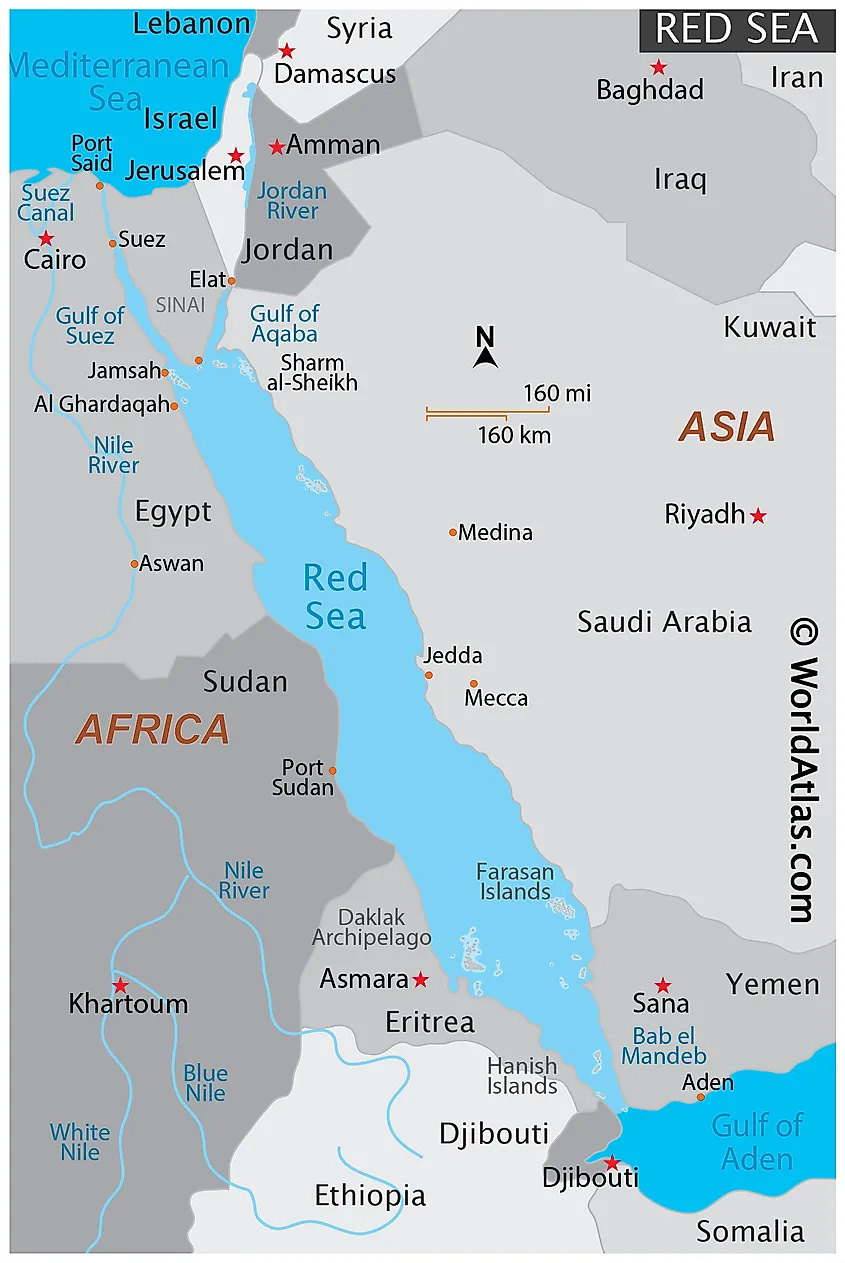Operation Prosperity Guardian: The Precarious Patch on Red Sea Security and the Looming Shadow of Future Conflict
By Chuck Warren
On December 18, the Department of Defense announced that Operation Prosperity Guardian, a U.S.-led, multinational coalition, had been formed to maintain the freedom of navigation in the Red Sea against the Houthis in Yemen. This looks more like an anti-piracy strategy to address a political problem by escorting commercial ships against military attacks. It might mitigate the issue temporarily, but it will not solve it permanently.
Between 10 and 15 percent of the world trade, including 30 percent of container ships, passes through the Red Sea. You might recall a week-long debacle in April 2021 when strong winds buffeted a merchant ship in the canal, blocking it and causing anxiety over global trade.
The Red Sea is critical to U.S. security for two reasons. First it connects two critical regions, Southeast Asia and Europe. Cutting them off from each other would make each reliant on their neighbors, including Russia for Europe and China for Southeast Asia. Second, it links Europe to the Persian Gulf and the Gulf of Oman, which are major sources of Europe's energy.
Two passages connect the Red Sea to global waters. The first is the Bab el-Mandeb, or 'the Gate of Tears,' located to the south, near Djibouti. To grasp the significance of this chokepoint, China is attempting to build a naval base in Djibouti to control it. In the north lies the Suez Canal, owned by Egypt, which was once a tract of land. Prior to the 1400s, trade between Europe and South and East Asia was possible only by land. This changed when sailors successfully navigated around the southern tip of Africa, connecting the two regions by sea. It is not a coincidence that just around that time humanity suddenly began to become rich. Four centuries later, the Suez Canal was built to make the route shorter and less contingent on weather and season—sailing near the South Pole in the winter was not optimal. Since 1889, Europe and Asia have been trading through the Suez Canal, greatly benefiting both continents.
This is important for U.S. security in two aspects. First, if America’s allies and partners in Europe and Southeast Asia are tightly connected to each other, they will be less likely to appease China and Russia to secure themselves and remain prosperous. Besides, because both are important trade partners of the United States, their prosperity directly correlates to ours. For instance, an increase in the global price of oil will also increase prices at American gas stations.
Second, there are many scenarios in which the U.S. Navy would have to pass through the Red Sea to supply itself, support an ally, or directly fight. For instance, the European Command in Europe and NATO members would have a much shorter route to defend the Middle East, Taiwan, or India. Even deploying the Navy from the East Coast to help India in a hypothetical war between China and India would make more sense from the East Coast than from the West Coast having to risk Chinese interference and harassment of our ships. During the Persian Gulf War, the U.S. Navy also played a key role by passing through the Red Sea to help the Air Force and the Army.
There is a third element. The Suez Canal belongs to Egypt. 7 out of every 100 dollars Egypt spends comes from Suez Canal profits. Egypt is also a critical government against Islamic terrorism. Some of the most critical theorists of Islamic terrorism came from Egypt, and the Muslim Brothers, the group that Hamas is an offshoot of, is a strong political force there. When the government of Egypt fell in 2011, the Muslim Brothers replaced it. If the current government falls again, the Muslim Brothers will likely replace it again and start promoting terrorism. And if you take out 7 percent of Egypt’s budget, the government could very well fall.
So, it makes sense that the United States is making a big deal out of this. Rather, it would make sense. It is troubling that President Joe Biden isn’t making a much bigger deal. Houthis’ story explains why.
Houthis are a Yemeni tribe and Shi’ite Muslims. Their political slogan is “Allahu Akbar, Death to America, Death to Israel, Damn the Jew, Victory to Islam.” In 2014, they overtook Yemen and currently control most of the country. Like all Shi’ite terrorist groups, they have close ties with Iran, where much of their military resources and intelligence comes from. It is disputed how much control Iran has over them. It is not total control, to be sure, but there is a good deal of it.
But Iran doesn’t need control, anyway. Iran prefers crazy groups that disrupt world order without asking so it can benefit from the chaos and the exhaustion of American resources without being held responsible.
The United States took little action to stop the Houthis. Even Donald Trump didn’t designate them as a terrorist group until his last days in office. After Joe Biden became president, he immediately reversed that decision as an olive branch to restart diplomatic ties with Iran.
This American inaction compelled Saudi Arabia and the UAE to act out of fear of having a hostile terrorist group with ties with their enemy in Tehran right in their neighborhood. This led to a brutal war. Democrats were shocked to see that Arab militaries don’t prosecute their war as gently as the U.S. military after decades of accusing the U.S. military of being too inhumane.
When Biden became president, he pulled all support for the war. This is when China entered to fill the vacuum Biden created. It brokered an agreement between Saudi Arabia and Iran to end the war in circumstances favorable to Iran. Not only did China’s partner, Iran, get the better hand, but also, Xi Jinping showed to be capable of solving a world problem America could not.
This explanation shows why, despite the calls to attack Houthis directly to get them to stop attacking ships in the Red Sea, which would be cheaper and faster, Biden is doing the more difficult and expensive task of escorting them instead.
The Saudis are asking him not to, and he doesn’t want to either. Both understand that this might reignite the war in Yemen or escalate to a larger war. Biden doesn’t want this because he doesn’t want to be involved in the Middle East. Saudis don’t want this because they fear that Biden will reignite the war and abandon them again, leaving the Saudis to lose even more ground.
You might think to yourself that Biden is doing the right thing because getting bogged down in another war in the Middle East is the last thing that we need. You’re correct about the last part. But the truth is that nobody in the region should be crazy enough to want to fight a war with the world’s greatest military. The reason that they would is that they know that Biden will cut and run because his Middle East policy for twenty years has been running away from the Middle East. As he showed in Afghanistan, he’d rather lose than fight. And when you tell the enemy that you’d rather lose than fight, then, they will decide that they can fight you. As Donald Rumsfeld used to say, weakness is provocative, and Biden is very weak.
Biden might be able to safeguard the Red Sea this time, but he will leave, and the Houthis will still be there and capable of closing it. The root of the problem will remain, and the enemy will only strengthen itself more to make for an even bloodier fight the next time. If Biden wants to solve the problem, he should assure the Saudis that he will give them everything they need to win the war this time. Or he doesn’t trust the Saudis, he can do the gutsier thing: He can attack Houthis directly, and if they hit back, he can hit them ten times harder and tell Iran that they will be attacked to if they won’t get Houthis to stop. If he does this, the Red Sea will be safe to navigate before Christmas Day.
Note: the opinions expressed herein are those of Chuck Warren only and not his co-host Sam Stone or Breaking Battlegrounds’ staff.



